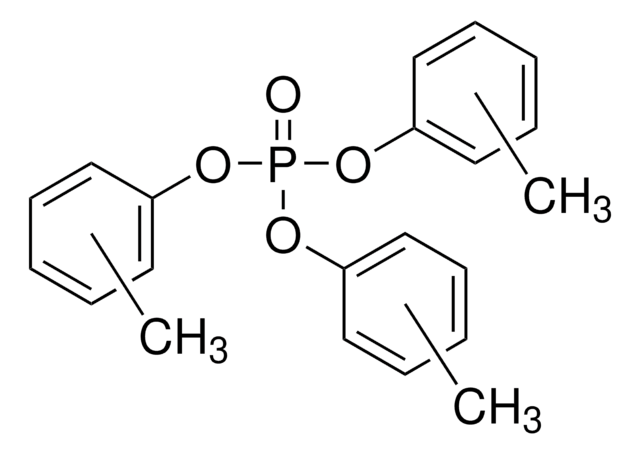130591
Tris(2-butoxyethyl) phosphate
94%
Synonym(s):
Phosphoric acid tris(2-butoxyethyl) ester
About This Item
Recommended Products
vapor density
13.7 (vs air)
Quality Level
vapor pressure
0.03 mmHg ( 150 °C)
Assay
94%
form
liquid
refractive index
n20/D 1.438 (lit.)
bp
215-228 °C/4 mmHg (lit.)
density
1.006 g/mL at 25 °C (lit.)
SMILES string
CCCCOCCOP(=O)(OCCOCCCC)OCCOCCCC
InChI
1S/C18H39O7P/c1-4-7-10-20-13-16-23-26(19,24-17-14-21-11-8-5-2)25-18-15-22-12-9-6-3/h4-18H2,1-3H3
InChI key
WTLBZVNBAKMVDP-UHFFFAOYSA-N
Looking for similar products? Visit Product Comparison Guide
General description
Application
- Monitoring of OPFRs in Environmental Samples: A novel method for the rapid monitoring of organophosphate flame retardants (OPFRs) such as tris(2-butoxyethyl) phosphate in environmental samples was developed, utilizing liquid-liquid extraction and gas chromatography-mass spectrometry. This method aids in assessing the biodegradation of such compounds effectively (Losantos et al., 2024).
- Presence in Landfill Soil: A case study explored the prevalence of tris(2-butoxyethyl) phosphate in inert landfill soil, highlighting the environmental impact and challenges in managing the disposal of materials containing this chemical (Stelzer et al., 2023).
- Bioremediation of Contaminated Soil: The study demonstrated that earthworms could enhance the bioremediation of soil contaminated with tris(2-butoxyethyl) phosphate by facilitating the release of degrading microbes, providing a sustainable method to mitigate environmental pollution (Wu et al., 2023).
- Assessment of Human Exposure to Household Chemicals: Research utilized on-line solid-phase extraction coupled with liquid chromatography-tandem mass spectrometry to assess human exposure to chemicals including tris(2-butoxyethyl) phosphate, commonly found in personal care and household products. This study aids in understanding population-level exposure dynamics (Senta et al., 2022).
- SVOCs Transmission from Indoors to Outdoors: Investigation into how textile washing conveys semi-volatile organic compounds (SVOCs) like tris(2-butoxyethyl) phosphate from indoor environments to outdoors, using a residential multimedia model to predict environmental dispersion and impact (Kvasnicka et al., 2021).
Storage Class Code
10 - Combustible liquids
WGK
WGK 1
Flash Point(F)
318.2 °F - closed cup
Flash Point(C)
159 °C - closed cup
Personal Protective Equipment
Choose from one of the most recent versions:
Already Own This Product?
Find documentation for the products that you have recently purchased in the Document Library.
Customers Also Viewed
Our team of scientists has experience in all areas of research including Life Science, Material Science, Chemical Synthesis, Chromatography, Analytical and many others.
Contact Technical Service











